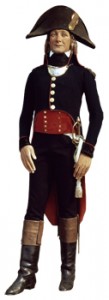In the classroom
Claude-Joseph Rouget was born in Lons-le-Saunier (Jura) on 10 May 1760. In order to enter the Military School in Paris, his family was forced to add the nobiliary particle “de Lisle” to the family surname. From 1776 to 1781, he studied at the Military School. In 1782, he entered the School for Engineers established at Mézières where only twenty candidates were admitted each year. A memorandum dated 8 October 1783, probably written by the principal of the school, paints a critical portrait of the future engineer : “Confirmed the opinion that he conveyed from the start […]. Studied only when required to do so and with the amount of negligence and clumsiness indicative of his total lack of emulation. Appears to be clever, can even show himself shrewd and full of insight when not studying. His character is gentle and honest ; however he should pay more attention in class instead of being idle”.
An uneven military career
Following his graduation in 1784, Rouget de Lisle enlisted in the Royal Engineers as Second Lieutenant. He was promoted to Captain on 1 April 1791, and assigned to Strasbourg where he met Ignace Pleyer (1757-1831), the famous maestro di cappella at the Strasbourg Minster. During the night of 26 to 27 April 1792, Captain Rouget de Lisle composed Le Chant de Guerre de l’Armée du Rhin (War Song for the Army on the Rhine), later renamed La Marseillaise. Although he had received a new assignment, he requested to fight as part of the Army of the Rhine. On 27 April 1792, Victor de Broglie addressed a letter to the minister of War in order to keep : “This officer […] who distinguished himself both by his talents and his patriotism”. However, the request came too late and Rouget de Lisle was obliged to assume the position of Chief Engineer of the Place of Huningue.
On 25 August 1792, the Commissioners of the National Assembly gathered in Huningue in order to obtain the political allegiance of the officers. Like many artillery and engineering officers, Rouget de Lisle’s refusal to swear allegiance resulted in his being suspended from duty.
The following verse poem written by Rouget de Lisle fully serves as a self-portrait :
I
Speaking honestly
Thinking openly
Let this my motto be !
Coming and going,
Staying and running,
Staying up at night
or Sleeping,
My own way,
Such is my pleasure.
An unassuming and pretty woman,
But not a little flirt,
Such is my desire.
To give my life
For the fatherland,
It is my hope.
Obstinate
but truthful,
As I am.
Extreme love I have
Unto good people
War to the bad
Such is my way.


Ajouter un commentaire